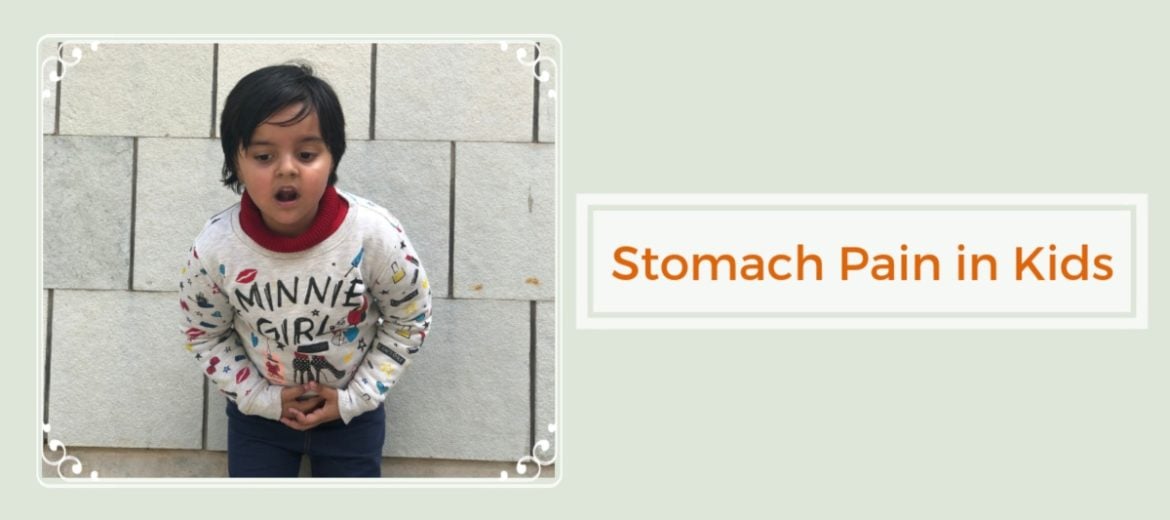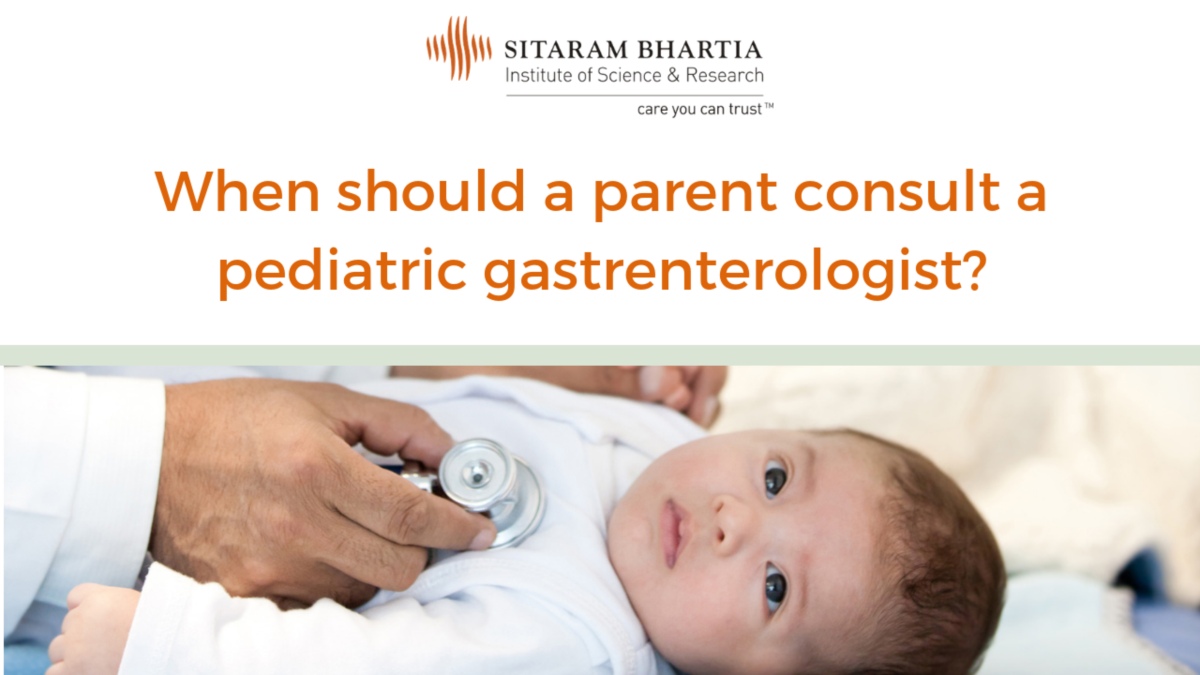Stomach pain in kids is very common. One in four children develop abdominal pain at some point between 3-18 years of age. It is one of the most common reasons why parents seek advice from a pediatric gastroenterologist.
Chronic abdominal pain is stomach ache in children that usually lasts for more than 2 months and does not respond to traditional treatments. Often the child is treated for acidity, gastritis, or dyspepsia. They are given home-remedies, de-worming, antibiotics and anti-acidity medicines repeatedly for weeks or months.
This is also the leading cause of school absenteeism. It can cause low self-esteem in children and a feeling of helplessness in parents in the absence of appropriate treatment. It also affects a child’s appetite and can lead to poor growth.
As a parent and a Pediatric Gastroenterologist and Hepatologist at Sitaram Bhartia Hospital, South Delhi, Dr. Nidhi Rawal would like to share this information with parents whose kids have frequent stomach aches.
Why would a child’s stomach hurt?
“There are myriad of reasons as to why a child might experience abdominal pain. It could be as simple as constipation to as something more complex like Celiac Disease or Inflammatory Bowel Disease. A chronic stomach pain in kids that is not responding to traditional treatments could be an indication that there is some underlying disease, and it needs to be looked into,” said Dr. Nidhi.
“If initial treatment or medicine for stomach pain for the child fails to work, then one should consider seeing a pediatric gastroenterologist.”
A stepwise approach, generally requiring a deep understanding of the pattern and evolution of the symptoms, is used to determine all possible causes. Delay in diagnosis and treatment can have detrimental effects on children’s growth.
Avoid unnecessary delays – resolve your doubts and queries today! Avail a second opinion from our Pediatric Gastroenterologist, Dr. Nidhi Rawal. Please call us on +8826391002 to schedule a consultation.
Some causes for chronic recurrent stomach pain in kids may include the following:-
- Constipation
- Acid reflux disease
- Celiac disease
- Inflammatory bowel disease
- Food allergy or intolerance
- Lactose intolerance
- Liver and Gallbladder disease
- Pancreatic disorders
- Appendicitis
“Some of these conditions, if not treated on time, can sometimes require surgical intervention, and hence, timely diagnosis and treatment is very important.”
What can I give a child with a stomach ache?
If your child’s pain has suddenly increased, or he/she is experiencing a very sharp pain which is not getting relieved with your current medications, please call our pediatrician at 011 4211-1111.
Do NOT self-medicate a child suffering from recurrent or chronic abdominal pain. If the child’s symptoms exacerbate, you can contact our pediatrician on call at Sitaram Bhartia if needed, who can guide you in the right direction.
Timely diagnosis and treatment of the cause of chronic abdominal pain, can make a significant difference in a child’s quality of life and can also prevent problems such as –
- poor growth problems in the child
- Anemia
- Vitamin D deficiency, etc.
When should I take my child to the ER for stomach pain?
When it comes to stomach pain in children, ‘when to worry’ is a common question asked at clinical consultations.
Parents are urged to take their child to the ER of the nearest hospital if their child –
- Is suffering from persistent vomiting
- Is inconsolable or irritable
- Is dehydrated
- Isn’t passing adequate amount of urine
- Has fever
- Has blood in vomit or stools
- Is not responding to medications
Can the location of the pain tell us if stomach pain in kids is serious or not?
The location of pain is not very reliable in children as it is harder to localize the source in children as opposed to in adults.
“Parents are advised to seek immediate attention if the child is in discomfort and is not responding to current treatment. Timely intervention can prevent surgical complications.”
What could be the other signs of gastrointestinal problems in kids?
In addition to abdominal pain, some of the other signs of gastrointestinal disease in children include:
- a recent decrease in appetite
- feeding difficulties
- difficulty swallowing foods
- vomiting
- night time symptoms
- blood in stool or vomiting
- constipation
- diarrhea
- jaundice
- persistent rashes
- weight loss or poor growth
When should I suspect my child might be dealing with a food allergy?
Food allergies can present themselves in two forms – IgE- and IgA-mediated allergies.
IgE-mediated allergies cause visible reactions when the food comes into contact with your child’s skin, mouth, or is eaten. The following reactions are what we would normally expect in allergies:
- Rashes
- Wheals (Urticaria)
- Ulcers in mouth
- Vomiting
- Loose stools
- Fall in blood pressure
- Wheezing
- Anaphylaxis
Symptoms of IgA-mediated allergies, on the other hand, are more subtle as the intestinal lining itself reacts to the food your child ingests. Most common foods known to be responsible for allergies include milk, soy, wheat, eggs, fish, or peanuts.
Most children exhibit the following symptoms if they are suffering from food allergies:
- Growth failure
- Appearance of a bloated stomach
- Anemia
- Recurrent abdominal pain
- Off-and-on pattern of loose stools
If your child starts experiencing any of the above symptoms, your pediatrician may conduct further investigations.
Stomach Ache in Children – Aanya’s Story
Aanya Yadav, 8, had been suffering from chronic abdominal pain for the past 3 months when her parents brought her into Sitaram Bhartia’s Emergency Room. Her condition seemed to have been worsening over the last 2 weeks.
She was examined by the pediatrician in the beginning and diagnosed with Acid Reflux disease. Although she was started on appropriate treatment immediately and her symptoms seemed to improve slightly at follow-up consultations, Aanya continued to suffer from abdominal pain, nausea and weight loss.
At this point, she was referred to Dr. Nidhi Rawal at Sitaram Bhartia Hospital. On further evaluation, it was revealed that the child was exhibiting symptoms such as –
- intermittent loose stools, with some blood in it
- ulcers in her mouth
- recent increase in diarrhea, from 2 daily to 4-5 episodes daily
- Anemia
- Severe Vitamin D deficiency
- Elevated markers of inflammation
- Poor weight gain
Dr. Nidhi decided to carry out an upper endoscopy and a colonoscopy, after which ulcers were discovered throughout her stomach as well as large intestine. This is a typical sign of Crohn’s disease, which can affect any part of our GI tract, and causes bleeding, ulcers, redness and swelling in the intestines.
If left untreated, it can lead to infection (abscess) and perforation in the GI tract which then requires surgical intervention.
Aanya’s diagnosis was discussed in detail with the family, and the child was started on appropriate medications. After two days, Aanya’s symptoms seemed to have improved significantly at a follow-up visit and the child was able to eat better. After a month of treatment, Aanya showed rapid signs of improvement with good weight gain and a normal appetite.


